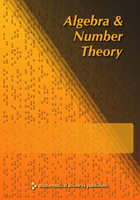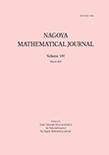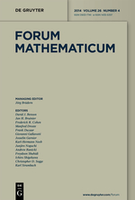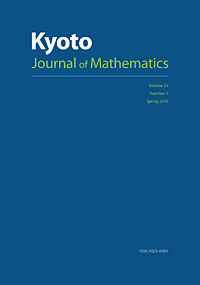
Forum of Mathematics Sigma
Scope & Guideline
Advancing mathematical frontiers for a global audience.
Introduction
Aims and Scopes
- Algebraic Geometry and Topology:
Research in this area includes investigations into moduli spaces, cohomology, and algebraic structures, often focusing on the geometric properties of algebraic varieties and their applications. - Representation Theory and Lie Algebras:
This scope encompasses the study of representations of algebraic groups and Lie algebras, including modular representations and their cohomological aspects. - Mathematical Physics and Quantum Theory:
The journal features works that bridge mathematics and physics, particularly in areas such as quantum mechanics, statistical mechanics, and integrable systems. - Combinatorics and Graph Theory:
Research here involves combinatorial structures, their properties, and applications, often intersecting with algebraic and geometric methods. - Number Theory and Arithmetic Geometry:
This includes studies on modular forms, Galois representations, and arithmetic properties of algebraic varieties. - Analysis and Partial Differential Equations:
The journal publishes research on mathematical analysis, including studies on PDEs, functional analysis, and stochastic processes. - Category Theory and Homological Algebra:
Works in this area focus on the categorical foundations of mathematics, exploring derived categories, sheaf theory, and related concepts.
Trending and Emerging
- Higher-Dimensional Algebra and Topological Structures:
There is an increasing focus on higher-dimensional algebra, including topics like derived categories and homotopical algebra, reflecting a trend towards understanding complex algebraic structures. - Noncommutative Geometry and Operator Algebras:
Research in noncommutative geometry and its applications to physics and other areas has gained momentum, indicating a growing interest in the interplay between algebra and geometry. - Stochastic Processes and Mathematical Finance:
An emerging trend is the exploration of stochastic processes and their applications in mathematical finance, reflecting the growing importance of probabilistic models in various fields. - Tropical Geometry and Its Applications:
Tropical geometry is gaining traction as a new area of interest, with applications in algebraic geometry and combinatorics, reflecting a shift towards more computational and geometric methods. - Categorical Logic and Foundations of Mathematics:
There is an increasing interest in the categorical foundations of mathematics, including topics like topos theory and categorical logic, indicating a trend towards exploring the foundations of mathematical theories.
Declining or Waning
- Classical Geometry:
There has been a noticeable decline in papers focused solely on classical geometry concepts, such as Euclidean and projective geometries, as the journal shifts towards more abstract and higher-dimensional studies. - Elementary Number Theory:
Research in basic number theory, particularly topics that do not intersect with algebraic or geometric approaches, appears to have decreased, with fewer papers focusing on elementary methods. - Basic Combinatorial Algorithms:
Although combinatorics remains a strong area, the focus on basic algorithmic approaches has waned, with more emphasis now on combinatorial structures that have deeper algebraic and geometric implications.
Similar Journals

RENDICONTI DEL SEMINARIO MATEMATICO DELLA UNIVERSITA DI PADOVA
Advancing mathematical knowledge for a global audience.RENDICONTI DEL SEMINARIO MATEMATICO DELLA UNIVERSITA DI PADOVA, published by the European Mathematical Society, stands as a notable open-access journal with a rich history in disseminating research across various domains of mathematics. With an ISSN of 0041-8994 and E-ISSN 2240-2926, this journal has embraced open access since 2023, significantly enhancing its visibility and accessibility to a global audience. Situated in Germany, its publishing house is based at Technical University Berlin, which emphasizes its academic roots and dedication to fostering mathematical research. The journal features a quartile ranking of Q3 across multiple categories including Algebra and Number Theory, Analysis, Geometry and Topology, and Mathematical Physics as of 2023, indicating a vibrant contribution to the field, despite its challenge in specific rankings. Researchers, professionals, and students alike will find in this journal a platform for innovative ideas and significant findings that are crucial to the evolution of modern mathematics.

Algebra & Number Theory
Unveiling New Horizons in Mathematical ScienceAlgebra & Number Theory, published by Mathematical Science Publications, stands at the forefront of mathematical research, particularly in the fields of algebra and number theory. With an ISSN of 1937-0652 and E-ISSN 1944-7833, this esteemed journal provides a dedicated platform for the dissemination of cutting-edge theoretical advances and practical applications. It has achieved a Q1 category ranking in both algebra and number theory according to the 2023 quartiles, reinforcing its critical role in shaping contemporary mathematical discourse. The journal serves as an essential resource for researchers, professionals, and students alike, offering insights into diverse mathematical methodologies and fostering open dialogue among scholars. Although it does not provide open access, its robust impact factor reflects the high quality and relevance of its published work. Based in the United States at the University of California, Berkeley, the journal's commitment to excellence continues to attract contributions that push the boundaries of mathematical understanding.

NAGOYA MATHEMATICAL JOURNAL
Shaping the Future of Mathematics with High-Impact ResearchNAGOA MATHEMATICAL JOURNAL, published by Cambridge University Press, is a prestigious journal that has been at the forefront of advancing mathematical scholarship since its inception in 1950. With an ISSN of 0027-7630 and an E-ISSN of 2152-6842, this journal has gained recognition for its high-quality research contributions in the field of mathematics, achieving a Q1 classification in Mathematics (miscellaneous) as of 2023. The journal’s impact is further reflected in its Scopus rank of #164 out of 399 in the General Mathematics category, positioning it within the 59th percentile of its peers. Scholars, researchers, and students can access a range of innovative mathematical studies that explore diverse topics, fostering a vibrant dialogue within the mathematical community. By catering to a global audience, the NAGOYA MATHEMATICAL JOURNAL continues to play a critical role in shaping contemporary mathematical discourse and research.

Cambridge Journal of Mathematics
Fostering Collaboration Through Mathematical InquiryCambridge Journal of Mathematics, published by INT PRESS BOSTON, INC, is a premier platform for the dissemination of cutting-edge research in the field of mathematics. With an ISSN of 2168-0930 and E-ISSN 2168-0949, this journal stands out in a competitive academic landscape, currently ranked #58 out of 399 in General Mathematics, placing it in the top 15% within its category according to Scopus metrics. The journal serves as a vital resource for researchers, professionals, and students alike, aiming to foster groundbreaking mathematical inquiries and foster collaboration across disciplines. Published from 2020 to 2024, the Cambridge Journal of Mathematics is committed to maintaining high standards of scholarship, making it an essential read for those who are passionate about advancing mathematical knowledge and its applications.

European Journal of Mathematics
Pioneering Research in the Heart of EuropeWelcome to the European Journal of Mathematics, a prominent publication that serves as a vital platform for disseminating high-quality research in the field of mathematics. Published by Springer International Publishing AG, this journal has witnessed significant growth since its inception in 2015 and is recognized for its contributions within the Q2 category of Mathematics (miscellaneous) as per the 2023 rankings. With an ISSN of 2199-675X and an E-ISSN of 2199-6768, the journal aims to foster innovation and collaboration among researchers, professionals, and students alike. Although it operates under a traditional access model, the journal's commitment to advancing mathematical knowledge and applications cannot be overstated. Positioned among the top-tier publications, the European Journal of Mathematics is an essential resource that encourages the exploration of emerging trends and theories in mathematics, making it indispensable for anyone striving to stay at the forefront of this dynamic field.

FORUM MATHEMATICUM
Fostering Knowledge: Your Gateway to Mathematical MasteryFORUM MATHEMATICUM, published by WALTER DE GRUYTER GMBH, is a distinguished academic journal based in Germany, known for its significant contributions to the field of mathematics. With an ISSN of 0933-7741 and an E-ISSN of 1435-5337, the journal features comprehensive studies ranging from applied mathematics to diverse mathematical disciplines. Having maintained a commendable presence since 1989, FORUM MATHEMATICUM has achieved notable classification rankings, including Q2 in Applied Mathematics and Q1 in miscellaneous Mathematics as of 2023. Additionally, it holds a Scopus rank within the top 60th percentile in General Mathematics, making it a prominent platform for researchers and professionals seeking rigorous analysis and innovative methodologies in mathematics. While the journal does not currently offer open access, its rich content is pivotal for advancing mathematical theory and applications, appealing to students and seasoned academics alike.

PUBLICATIONES MATHEMATICAE DEBRECEN
Pioneering Insights in Theoretical and Applied MathematicsPublicationes Mathematicae Debrecen is a renowned international journal published by the University of Debrecen, Institute of Mathematics, situated in Hungary. This journal, with both ISSN 0033-3883 and E-ISSN 2064-2849, has established itself in the field of mathematics since its inception, with coverage extending from 1997 to 2024. Recognized for its rigorous academic standards, it currently holds a Q3 ranking in the mathematics (miscellaneous) category for 2023 and ranks at the 42nd percentile among general mathematics journals in Scopus. Publicationes Mathematicae Debrecen aims to disseminate high-quality research across various areas of mathematics, contributing to the advancement of knowledge and practice in this dynamic field. Although it is not an open-access journal, its readers can access a wealth of scholarly work that addresses both theoretical and applied mathematical issues, making it an invaluable resource for researchers, professionals, and students alike.

Pure and Applied Mathematics Quarterly
Shaping the Future of Mathematics with Every IssuePure and Applied Mathematics Quarterly is a prestigious journal published by INT PRESS BOSTON, INC, focusing on the diverse and evolving field of mathematics. Since its inception in 2007, this journal has grown significantly, currently holding a Q1 ranking in the Mathematics (Miscellaneous) category for 2023, positioning it among the leading publications in the discipline. With a commitment to publishing high-quality research, Pure and Applied Mathematics Quarterly fosters innovation and dialogue within the mathematical community by providing a platform for theoretical advancements and practical applications. The journal remains accessible to researchers and professionals through its ISSN 1558-8599 and E-ISSN 1558-8602, although it does not currently offer open access. As a vital resource for mathematicians, educators, and students, this journal endeavors to expand the frontiers of mathematical knowledge and contribute to the academic dialogue surrounding this fundamental science.

ANNALS OF MATHEMATICS
Fostering Groundbreaking Discoveries in MathematicsANNALS OF MATHEMATICS is a prestigious peer-reviewed journal published by the Department of Mathematics at Princeton University, dedicated to the advancement of mathematical research across diverse fields, including mathematics, statistics, and probability. With an impressive impact factor reflecting its critical role in the academic community, this journal is categorized within the Q1 quartile rankings for both Mathematics and Statistics in 2023, evidencing its high circulation of influential and often-cited publications. Researchers can access the latest findings and theoretical advancements in an environment that fosters intellectual discourse and innovation, although the journal does not currently offer open access. Spanning a remarkable convergence period from 1996 to 2024, the ANNALS OF MATHEMATICS serves as a vital resource for mathematicians, statisticians, and analysts striving to push the boundaries of knowledge and application in these critical fields.

Kyoto Journal of Mathematics
Connecting minds, sharing knowledge, transforming mathematics.Kyoto Journal of Mathematics is a premier academic publication dedicated to advancing the field of mathematics, published by DUKE UNIVERSITY PRESS. Established in 1996, this journal serves as a vital platform for sharing innovative research and breakthrough studies across various mathematical disciplines. The journal has consistently maintained a prestigious Q1 ranking in the category of Mathematics (miscellaneous) as of 2023, reflecting its significant impact and contribution to the mathematical community. With its Open Access policy, the Kyoto Journal of Mathematics ensures that groundbreaking research is easily accessible to a global audience, fostering collaboration and knowledge dissemination among researchers, professionals, and students alike. The journal's commitment to excellence and relevance in mathematical research is underscored by its extensive archive of published works and its continuous engagement with contemporary mathematical challenges. This makes the journal an essential resource for anyone seeking to stay abreast of current trends and advancements in the field.